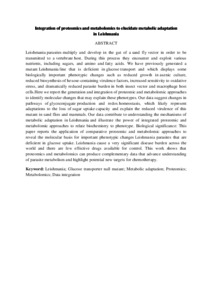Citation
Akpunarlieva, Snezhana and Weidt, Stefan and Lamasudin, Dhilia Udie and Naula, Christina and Henderson, David and Barrett, Michael and Burgess, Karl and Burchmore, Richard
(2017)
Integration of proteomics and metabolomics to elucidate metabolic adaptation in Leishmania.
Journal of Proteomics, 155.
pp. 85-98.
ISSN 1874-3919; ESSN: 1876-7737
Abstract
Leishmania parasites multiply and develop in the gut of a sand fly vector in order to be transmitted to a vertebrate host. During this process they encounter and exploit various nutrients, including sugars, and amino and fatty acids. We have previously generated a mutant Leishmania line that is deficient in glucose transport and which displays some biologically important phenotypic changes such as reduced growth in axenic culture, reduced biosynthesis of hexose-containing virulence factors, increased sensitivity to oxidative stress, and dramatically reduced parasite burden in both insect vector and macrophage host cells.Here we report the generation and integration of proteomic and metabolomic approaches to identify molecular changes that may explain these phenotypes. Our data suggest changes in pathways of glycoconjugate production and redox homeostasis, which likely represent adaptations to the loss of sugar uptake capacity and explain the reduced virulence of this mutant in sand flies and mammals. Our data contribute to understanding the mechanisms of metabolic adaptation in Leishmania and illustrate the power of integrated proteomic and metabolomic approaches to relate biochemistry to phenotype. Biological significance: This paper reports the application of comparative proteomic and metabolomic approaches to reveal the molecular basis for important phenotypic changes Leishmania parasites that are deficient in glucose uptake. Leishmania cause a very significant disease burden across the world and there are few effective drugs available for control. This work shows that proteomics and metabolomics can produce complementary data that advance understanding of parasite metabolism and highlight potential new targets for chemotherapy.
Download File
![[img]](http://psasir.upm.edu.my/62193/1.hassmallThumbnailVersion/Integration%20of%20proteomics%20and%20metabolomics%20to%20elucidate%20metabolic%20adaptation%20in%20Leishmania.pdf)  Preview |
|
Text
Integration of proteomics and metabolomics to elucidate metabolic adaptation in Leishmania.pdf
Download (93kB)
| Preview
|
|
Additional Metadata
Actions (login required)
 |
View Item |

